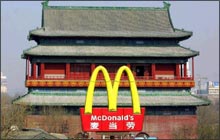 Imposing Free-Market Democracy Unleashes Ethnic Hatred World on Fire
Imposing Free-Market Democracy Unleashes Ethnic Hatred World on Fire considers Israeli Jews as a regional market-dominant minority. As such this regional minority contributes to a familiar pattern underlined by Amy Chua's prediction: "if popular elections were held throughout the Arab world, Israel would be a common whipping boy among vote-seeking politicians." The book does not seek to relate Middle East instability to mondial instability, or to take note of the widespread if not worldwide identification of Israeli Jews with Americans as a single global market-dominant force. A chapter entitled "Why They Hate Us" focuses upon the U.S. Chua does classify Ashkenazi Jews as a market-dominant minority within Israel, and touches upon Palestinians as a potential entrepreneurial factor throughout the region.
Chua outlines this dynamic early and with characteristic clarity: "When free market democracy is pursued in the presence of a market-dominant minority, the almost invariable result is backlash. This backlash typically takes one of three forms. The first is a backlash against markets, targeting the market-dominant minority's wealth. The second is a backlash against democracy by forces favorable to the market-dominant minority. The third is violence, sometimes genocidal, directed against the market-dominant minority itself."
 "World On Fire" by Amy Chua - Salon
"World On Fire" by Amy Chua - Salon"World On Fire" is about a phenomenon Chua calls "market-dominant minorities," groups like the Chinese in Southeast Asia, Jews in Russia, whites in Zimbabwe and Indians in East Africa and Fiji. Market-dominant minorities control hugely disproportionate percentages of their countries' resources. Filipino Chinese comprise just 1 to 2 percent of the Philippines' population, but control all of the country's major supermarkets, fast-food restaurants and large department stores, and all but one of the nation's banks. A similar situation obtains in Indonesia. Jews make up a similarly tiny proportion of Russia's population, but of the seven "oligarchs" who control virtually all of the country's business, six are Jewish. Lebanese dominate the economies in Sierra Leone and Gambia, while Indians dominate the economy in Kenya, along with a smaller, indigenous minority tribe called the Kikuyu. Similar examples abound worldwide.
It's enormously touchy to talk about the economic element of communal violence, especially regarding Jews, since rhetoric about one ethnic group exploiting another is so often a precursor to atrocity. But that's exactly why Chua's book feels so urgent. No matter how politically incorrect it is to talk about, her book makes clear that minority market domination is a reality in much of the world, one that's tied up in many ways with smoldering group hatreds and explosions of mass slaughter, and one that's made worse by Western policies.
Heather -- The Fall of the Roman Empire
Amy Chua's book "World on Fire: How Exporting Free Market Democracy Breeds Ethnic Hatred and Global Instability" [reviewed here] presents her argument that much of the world's economic activity is controlled by "market-dominant minorities" (MDMs) and as democratic values take hold, there is often a conflict with the power of those minorities in dangerous ways. More dramatically, she proposes that the US is effectively now a global "market-dominant minority" which controls global values and activities in ways that are often not in the best interest of many entrenched or traditional power bases in the industrial and non-industrialized world.
Even more recently, I had a chance to read Moises Naim's "Illicit: How Smugglers, Traffickers, and Copycats are
Hijacking the Global Economy," [reviewed here] which looks at illegal traffic in humans, drugs, guns, information, and cash from a neutral or economic perspective. His investigations suggest that illicit trade is growing much, much quicker than legitimate trade thanks to reduced costs of communication and transportation. And law enforcement is falling behind, when it is even cognisant enough to spot the new forms of illicit trade.
Taken as a set, these three books suggest sobering times ahead. The patterns they describe are deeply engrained in our modern world and guide world events as the tides would a boat. We can also add to this list Tom Barnett's book "The Pentagon's New Map" which charts the flow of people, money, ideas, equipment, and violence in different directions to form a geopolitical pattern with contrasting Gap and Functioning Core. Barnett recommends particular institutional solutions to "shrink the Gap."
WNYC - Reading Room: World on Fire: How Exporting Free Market ... Council on Foreign Relations Press June 2000
Democracy isn't working It is the west's calling card, but its global applicability is now in doubt The most intellectually honest case for the war in Iraq was never about Saddam Hussein's alleged stockpiling of weapons of mass destruction. It was the Big Bang Theory.
Not to be confused with theories about the origins of the universe, the Middle East Big Bang idea was simple and seductive. Unlike other arguments for the war, it was based on some facts, though also on some wishful thinking. The point was that the Middle East was a mess. A nest of authoritarian regimes bred opposition movements rebelling against the conditions under which too many people lived and energized by a radical Islamist ideology. Some of them turned to terror. In this bog of failure, moderate Muslims were powerless. They were frequently jailed or killed.
Democracy - Not "The Free Market" - Will Save America's Middle Class
Here are a couple of headlines for those who haven't had the time to study both economics and history:
1. There is no such thing as a "free market."
2. The "middle class" is the creation of government intervention in the marketplace, and won't exist without it (as millions of Americans and Europeans are discovering).
The conservative belief in "free markets" is a bit like the Catholic Church's insistence that the Earth was at the center of the Solar System in the Twelfth Century. It's widely believed by those in power, those who challenge it are branded heretics and ridiculed, and it is wrong.
In actual fact, there is no such thing as a "free market." Markets are the creation of government.
Markets are a creation of government, just as corporations exist only by authorization of government. Governments set the rules of the market. And, since our government is of, by, and for We The People, those rules have historically been set to first maximize the public good resulting from people doing business.
If you want to play the game of business, we've said in the US since 1784 (when Tench Coxe got the first tariffs passed "to protect domestic industries") then you have to play in a way that both makes you money AND serves the public interest.
Stop Calling It Free Trade! - Reclaim Democracy.org
International trade agreements erect trade barriers as often as they remove them. As Wayne Andreas, CEO of agribusiness giant Archer Daniels Midland, said, "
There is not one grain of anything in the world that is sold in the free market. Not one. The only place you see a free market is in the speeches of politicians." Well acquainted with
both illegal price fixing and legally wielding political power to extract taxpayer subsidies, Andreas knows of what he speaks.
Free Market Democracy and the Chilean and Mexican Countryside ...Democracy's stability in Chile and Mexico may depend as much, or more critically, on the transformation of social structure and social life induced by the imposition of free market policies in the 1970s and 1980s. This book demonstrates how rural societal transformations induced by free markets support national democratic consolidation. Although existing research has often examined the effect of democratic politics on the process of economic reform, it has avoided analyzing how free market reforms are connected to the process of democratic consolidation.
Security and Democracy in a Free Market - Global Policy Forum ... It was unfortunate that the ideas of Indian-born economist Amartya Sen did not reach Thailand prior to 1997, otherwise the country might have better faced up to, or even been able to avoid, the economic crisis. Back then, as many may recall, faith in the open market system prevailed. Thai policymakers of the 1990s did not dare move away from sole attention on "growth" despite their concerns about inequality and the quality of growth.
But to Sen, the market economy hasn't succeeded, not because some people's interests are suppressed and other people are kept from the market, but because people gain individual advantage from it.
Sen is one of the leading advocates of economic thinking who does not share Milton Friedman's and the Chicago School's faith in free market economics. The Friedman world has little space for consideration of poverty. These champions of complete economic liberalisation simply thought that poverty would be drastically reduced if their system were allowed full rein.
Sen dismissed such a view as too narrow. Instead, he promoted "welfare economics" which looks beyond the operation of the market to a scrutiny of the institution of poverty and the concept of "need".
Next month, Sen will be in Bangkok to share his thoughts and push the issues related to deprivation, poverty and democracy on to the agenda of acceptable norms of development. The 1998 Nobel laureate will join 1,500 participants at a regional confidence on "Challenges on creating human security in the era of globalisation", hosted by Chulalongkorn University.
Sen's presence on the issue of human security caps his success in merging economics and ethics. Here, he shot down a previous argument of free marketers like Friedman that two parties will enter an exchange, as long as it is voluntary, if they can benefit.
Sen's thinking, however, is that many people who aren't poor are nevertheless interested in the problem of poverty, and its eradication, not because they think it is more "efficient" to remove it but because it is "wrong"! In other words, many individuals often behave ethically, that is, they do not put their own self-interest first.
In practice, he also observed that various cooperative strategies among firms or groups are invariably adopted because people have notions of other's rights (as well as their own); they have a sense of community, which they want to continue even in a free market environment.
While people do have a general ethical view of life that is not purely selfish, there are implications for the economic organisation of society, taxation structures, financial assistance to the poor and the recognition of social needs.
CORNEL WEST--DEMOCRACY MATTERS IN OUR TIME: LOGOS SUMMER 2004 In our market-driven empire, elite salesmanship to the demos has taken the place of genuine democratic leadership. The majority of voting-age citizens do not vote. They are not stupid (though shortsighted). They know that political leadership is confined to two parties that are both parasitic on corporate money and interests. To choose one or the other is a little like black people choosing between the left-wing and right-wing versions of the Dred Scott decision. There is a difference but not much—though every difference does matter.
Yet a narrow rant against the new imperialism or emerging plutocracy is not enough. Instead we must dip deep into often-untapped wells of our democratic tradition to fight the imperialist strain and plutocratic impulse in American life. We must not allow our elected officials—many beholden to unaccountable corporate elites—to bastardize and pulverize the precious word democracy as they fail to respect and act on genuine democratic ideals.
The problems plaguing our democracy are not only ones of disaffection and disillusionment. The greatest threats come in the form of the rise of three dominating, antidemocratic dogmas. These three dogmas, promoted by the most powerful forces in our world, are rendering American democracy vacuous. The first dogma of free-market fundamentalism posits the unregulated and unfettered market as idol and fetish. This glorification of the market has led to a callous corporate-dominated political economy in which business leaders (their wealth and power) are to be worshipped—even despite the recent scandals—and the most powerful corporations are delegated magical powers of salvation rather than relegated to democratic scrutiny concerning both the ethics of their business practices and their treatment of workers. This largely unexamined and unquestioned dogma that supports the policies of both Democrats and Republicans in the United States—and those of most political parties in other parts of the world—is a major threat to the quality of democratic life and the well-being of most peoples across the globe. It yields an obscene level of wealth inequality, along with its corollary of intensified class hostility and hatred. It also redefines the terms of what we should be striving for in life, glamorizing materialistic gain, narcissistic pleasure, and the pursuit of narrow individualistic preoccupations—especially for young people here and abroad.
When it comes to "democracy" and "rule of law," the neocons reveal their historical roots in the
New Class/Crolyite politics of the "Progressive" era. "Democracy" means participating in a periodic legitimization ritual in which you select the professional elites that govern you, after which you sit down and shut up. The democracy, of course, should be as centralized, indirect, and all-around Hamiltonian as possible. Politics should be the domain of apolitical expertise, with conflict minimized and decisions based on the consensus of right-thinking people (i.e., the centrist establishment of men in suits who control big government and big business). Although the neocons love to emphasize decentralist values in their talk of "civil society," their version of civil society and citizen involvement applies only to the realms of private consumption and recreation; it implies nothing remotely touching on the spheres of self-government or economic production, that might undermine the control of the duly constituted managerial and plutocratic classes over the corporate state.
Iraqi democracy, like the kind just established in Afghanistan, means choosing the guy who will take orders from the IMF/World Bank and start implementing the privatization/austerity/"intellectual property" regime designed by Milton Friedman or Jeffrey Sachs.
Joseph Stromberg recently
described a recurring neoliberal pattern of "privatization" that might be more accurately described as the systematic looting of public assets by politically connected corporate elites. Stromberg described the typical "privatization" procedure as "funny auctions, that amounted to new expropriations by domestic and foreign investors"; the likely result, he says, is "a massive alienation of resources into the hands of select foreign interests." More specifically, Naomi Klein
recounted, in vomit-inducing detail, the kind of "democracy" the Iraqi Provisional Authority tried to foist on the Iraqi people.
(It's odd, by the way, that the people so intent on introducing "free market" principles to the state-owned Iraqi economy under Bremer were in remarkably little hurry about removing Saddam's draconian penalties for organizing independent labor unions.)
Democracy Against the Free Market: The Enron Crisis
and the Politics of Global DeregulationChomsky: Market Democracy in a Neoliberal OrderRealistic View of US Past— Free Market Policies Not Democracy’s Key| |
| by Arundhati Roy
Presented in New York City at The Riverside Church
May 13, 2003 |
Thwarted by a surge of democracy
Under cover of unification, free market liberals hijacked Europe
Find blog posts, photos, events and more off-site about:
Chua, World-On-Fire, Democracy&free-markets
blogs, private-property, landowner-rights, property-rights, Canada, constitution, Missouri-Breaks, encroachment, commons, peasants, libertarian, left-libertarian, agora, market, Proudhon, anarchism, property-is-theft,agorism, anarchism, anarchy, indvidualism, libertarian-communist, libertarian-socialism, left-libertarian, libertarian, agora, agorist, market






